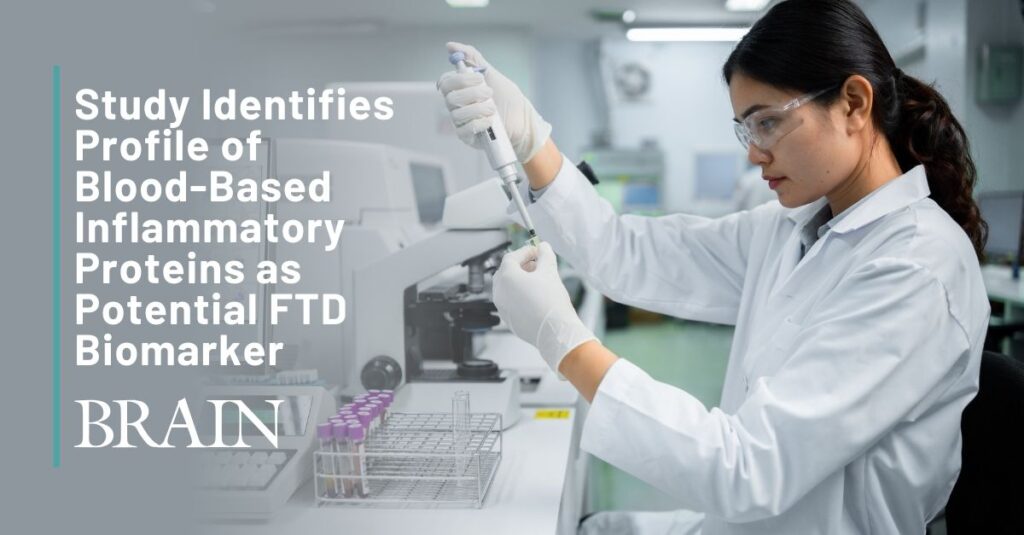Study Identifies Profile of Blood-Based Inflammatory Proteins as Potential FTD Biomarker

A study published in the journal Brain earlier this year identified a profile of inflammation-related proteins that could potentially serve as a FTD biomarker gauging the severity of the disease. The profile of proteins was identified through blood serum samples, with the authors emphasizing the accessibility of blood-based biomarkers over others.
Cytokines Released by Neuroinflammation, a Common Feature of FTD
Previous studies have shown that neuroinflammation is a pathogenic process shared by FTD disorders. When FTD causes neuroinflammation, the brain’s immune cells activate and release pro-inflammatory proteins called cytokines. While this process is helpful initially, continual neuroinflammation can damage neurons and exacerbate the progression of FTD.
While treatment strategies are being researched to address neuroinflammation in FTD, the authors note that a clear understanding of the profile of proteins in FTD is needed to properly design disease-progression models and clinical trials. However, the authors also emphasize the need for any set of biomarkers to be accessible and scalable; PET-based biomarkers, for example, are not easily scalable due to the high cost and lack of access to scanners in many clinical centers internationally. Because they can be accessed through a cost-effective and accessible phlebotomy, blood-based biomarkers are an accessible and easily scalable option.
To determine if levels of a certain profile of cytokines in blood can be used as a biomarker for FTD severity, the researchers conducted an analysis of blood serum samples from people living with FTD. Through two centers at the University of Cambridge for FTD and Parkinsonian disorders, the researchers recruited 214 people with FTD: 52 with behavioral variant FTD (bvFTD), 58 with progressive supranuclear palsy (PSP), 53 with corticobasal syndrome (CBS), 20 with semantic variant PPA (svPPA), and 31 with nonfluent/agrammatic variant PPA (nfvPPA). In addition, 29 people without FTD were recruited to serve as controls.
All participants underwent phlebotomy and the same battery of cognitive tests, while a sub-cohort of 44 people underwent PET scans to test if raised cytokine profiles were correlated with inflammation in the central nervous system.
Raised Cytokine Levels Reflect Greater Disease Severity
After analyzing samples and conducting a statistical analysis, the authors of the study found that the cytokine profile differentiated people with FTD from controls, and that the profile was detectable in all FTD disorders. The cytokine levels were higher in all forms of FTD compared to control participants, though the level varied between disorders.
| Disorder | Cytokine Level Compared to Controls |
| bvFTD | 4.94 |
| PSP | 4.37 |
| CBS | 4.77 |
| nfvPPA | 5.49 |
| svPPA | 3.55 |
The elevated cytokine profile was correlated with similar findings in the PET cohort, confirming that cytokine levels in blood correlate with neuroinflammation. The authors underscore the importance of blood biomarkers such as those they identified, though they also note the drawbacks of using the cytokine profile. The topographical data provided through imaging such as PET, which shows which areas of the brain are degenerating, is not available using blood-based cytokines.
The heightened cytokine levels are also not specific to any FTD disorder; this means they cannot be used to make a differential diagnosis between them. However, the shared nature of the cytokine levels also means that an immunotherapeutic approach for on FTD disorder might be usable for the rest. Additionally, higher cytokine levels compared to others with FTD indicates greater severity, meaning that they can be used as a biomarker to help determine someone’s prognosis.
AFTD supports researchers searching for biomarkers for FTD through our grant programs and by providing opportunities for scientists across fields to collaborate and compare findings. The 2023 Holloway Summit was focused on the discussion of potential FTD biomarkers, the 2024 FTD Research Roundtable expanded on this topic by tackling problems in the way of clinical trials such as a lack of biomarkers.
Blood-based biomarkers can make FTD diagnostics more accessible by streamlining the data-collection process. Universities in the U.K. are conducting an extensive blood biomarker survey to develop blood tests to be used for diagnosing dementia. A different study found that TDP-43 levels in blood serum samples could be used for differential diagnosis of FTD.
By Category
Our Newsletters
Stay Informed
Sign up now and stay on top of the latest with our newsletter, event alerts, and more…

